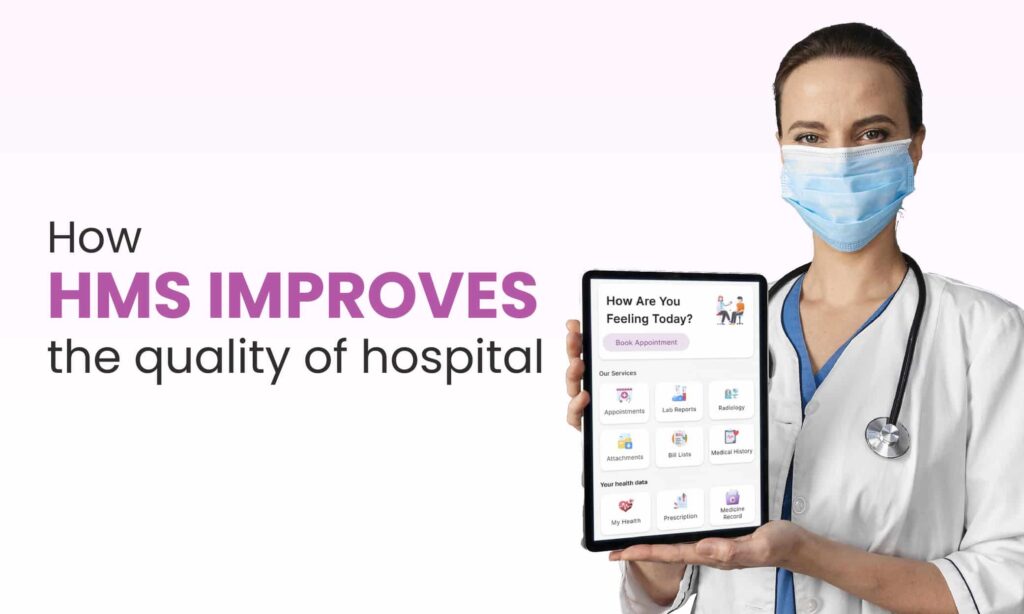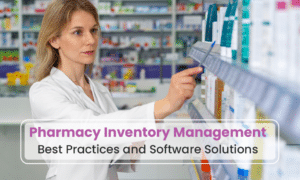
The landscape of the healthcare industry has been dramatically reshaped by an unprecedented digital revolution; with the Advantages of Hospital Information System you can make yourself at the forefront of this transformation. This advancement signals a decisive shift towards data-centric methodologies aimed at refining the operational dynamics of healthcare facilities.
HMIS stands as a foundational element in this shift, streamlining critical processes such as patient record management, appointment scheduling, report generation, and billing, all while synergizing seamlessly with Electronic Health Records (EHR). This convergence of essential, cutting-edge technologies not only enhances the operational efficiency of healthcare services but also equips organizations with the tools to make well-informed decisions based on robust data analytics, setting a new standard for excellence in healthcare delivery.
What is HMIS?
A Hospital Management Information System (HMS) stands as an all-encompassing, unified information platform engineered to oversee the myriad operations within a hospital, covering medical, administrative, financial, and operational realms, alongside the efficient processing of services. Fundamentally, it serves as a digital infrastructure that not only automates but also refines the intricate internal workflows of a hospital or healthcare establishment, ensuring a smoother, more efficient management system.
What are the Functions and Advantages of Hospital Information System?
To facilitate ease of implementation and to tailor to the unique requirements of hospitals, an HMIS system is typically segmented into distinct modules. Below is an overview of the modules most frequently employed within hospitals:
- Patient Registration
- Appointment Scheduling
- Daycare/Emergency Management
- Outpatient Department (OPD) Management
- Inpatient Department (IPD) Management
- Operating Theatre (OT) Management
- Third-Party Administrator (TPA) Management
- Pathology Software
- Pharmacy Software
- Laboratory Information System (LIS)
- Radiology Information System (RIS)
- PACS
- Inventory Management
- Payroll Management
- Finance and Accounting
- HMIS Reports
- Blood Bank Management
- Radiology Software
What do the Advantages of Hospital Management Information System Improve the Quality of Hospitals?

1. Improved Resource Management
Hospital Management Information Systems (HMIS) streamline administrative tasks including patient registration, appointment scheduling, billing, and inventory management, alleviating the need for manual intervention. This transition minimizes errors and maximizes resource utilization, resulting in efficient appointment scheduling, optimized staff and facility usage, precise billing, and effective revenue management.
According to the National Library of Medicine, an HMIS system can boost staff performance by 64.42%, a figure that can rise to 81.85% with a well-strategized HMIS implementation.
2. A Centralized Repository for Patient Data
Managing the extensive data generated in healthcare is a significant challenge, with numerous records created for each patient interaction. This accumulation of paperwork throughout a patient’s journey requires an efficient system for organizing and accessing data. Hospital Management Information Systems (HMIS) offer a solution by serving as centralized repositories for patient information. With HMIS, medical staff can access complete medical histories instantly, streamlining care delivery and enhancing quality by ensuring all necessary information is readily available. Ezovion’s Electronic Health Records (EHR) and Electronic Medical Records (EMR) Software exemplify these advancements, providing cloud-based platforms that standardize and secure patient health records while offering real-time, data-driven solutions for all aspects of patient care.
3. Patient engagement
Patient engagement is increasingly recognized as a crucial aspect of modern healthcare delivery, aiming to enhance patient satisfaction, improve health outcomes, and foster proactive involvement in one’s own care. Ezovion provides several tools and platforms that have emerged to facilitate this engagement, offering patients convenient access to healthcare services and information. Healthcare KIOSKs are used for streamlined check-ins and access to educational materials, Online Appointment Booking for convenient scheduling, Patient Relationship Management Systems (PRM) for personalized communication, Patient Portals for secure access to medical records, Mobile Apps for on-the-go healthcare services, Telemedicine for remote consultations, and SMS/Email communication for appointment reminders and educational resources. These modules collectively promote patient involvement in their care and facilitate better communication between patients and healthcare providers.
4. Data-driven Insights:
Hospital Management Information Systems (HMIS) are pivotal in transforming healthcare delivery through the comprehensive use of data analytics. These advanced systems gather and process a wide array of data, offering deep insights into various facets of hospital operations and the efficient use of resources. Through the strategic analysis of this data, hospitals can pinpoint critical areas for enhancement, judiciously allocate resources, and adopt practices grounded in solid evidence to uplift patient care standards.
Ezovion HMIS offers several modules that facilitate strategic planning and resource management. By shedding light on data and pinpointing operational inefficiencies, Ezovion empowers healthcare facilities to fine-tune their staffing allocations, make smarter equipment investments, and refine inventory control measures. Such targeted resource allocation not only boosts operational efficiency but also ensures that patient care services are delivered more effectively and responsively.
5. Compliance and Accreditation:
Ensuring the security and compliance of hospital data is paramount, given the sensitive nature of patient information and the prevalence of cyber attackscyber-attacks in healthcare. Hospital Management Information Systems (HMIS) play a crucial role in safeguarding data from unauthorized access and ensuring its confidentiality and integrity. By implementing robust privacy and security measures such as access controls, encryption protocols, and audit trails, HMIS helps hospitals comply with regulations like HIPAA and protect patient information from breaches. Additionally, HMIS features facilitate auditing and reporting, enabling hospitals to track compliance with regulatory requirements and accreditation standards, simplifying the process of demonstrating adherence during accreditation audits.
6. Device Integration
Hospital Management Information Systems (HMIS) are pivotal in transforming healthcare by seamlessly integrating medical devices into hospital workflows, thereby enhancing the efficiency of data flow into electronic health records and guaranteeing immediate access to essential patient information. This integration ensures interoperability among a broad spectrum of medical equipment, which streamlines clinical decision-making and enhances workflow efficiency. By reducing the administrative burden on healthcare professionals, HMIS allows for more focused time on direct patient care, significantly improving operational efficiency across healthcare facilities.
The capability for real-time monitoring and the generation of alerts facilitated by HMIS are crucial for enabling swift interventions, thus significantly enhancing patient safety and the quality of care. Moreover, the incorporation of data analytics and artificial intelligence within HMIS provides valuable insights that support evidence-based decisions and the customization of care plans tailored to individual patient needs. This advanced level of device integration through connected care platforms, such as those offered by Ezovion, enables continuous monitoring of patient vital signs and the automatic generation of alerts for critical events, empowering clinicians to act promptly in emergencies.
7. Interoperability
One of the Advantages of Hospital Information System are instrumental in promoting interoperability within hospitals by serving as central repositories for patient health records and integrating data from various sources like electronic health records (EHRs), medical imaging systems, and laboratory information systems (LIS). Through adherence to industry-standard interfaces and interoperability protocols such as HL7 and FHIR, HMIS ensures seamless integration with other healthcare IT systems and facilitates secure data exchange between hospitals, clinics, and external healthcare organizations.
Additionally, HMIS platforms interface with Health Information Exchanges (HIEs), enabling the secure exchange of patient health information across disparate healthcare entities. By streamlining clinical workflows, empowering patient engagement, and supporting interoperability standards and initiatives, HMIS plays a pivotal role in enhancing care coordination, clinical efficiency, and patient outcomes within hospitals.
8. Artificial Intelligence:
Artificial Intelligence is one of the Advantages of Hospital Information System to leverage the significant improvement in healthcare quality. AI algorithms in HMIS sift through patient data, uncovering insights for better clinical decisions and patient outcomes. Ezovion enhances this with its AI solutions like the FracID AI Solution for radiology image analysis, identifying health parameters with unparalleled accuracy, and Speech to Text for speeding up documentation fivefold, improving patient flow and experience.
Additionally, Ezovion’s Robotic Process Automation (RPA) streamlines referrals and order management, allowing doctors to easily refer patients and communicate with billing and administrative departments on a unified platform. These innovations exemplify how AI is transforming healthcare delivery and management.
9. Data Security
Hospital Management Systems (HMS) are transforming hospital data security and patient care. They start with role-based access, ensuring only the right personnel can see sensitive information. HMS protects data with encryption and data masking, making it secure during storage and transmission while keeping privacy intact.
Should anything go wrong, HMS’s automated backups quickly restore lost data, acting as a reliable safety net. It also monitors user activities closely, spotting any unauthorized access swiftly to prevent breaches. Integrated with security measures like IDS and firewalls, HMS strengthens defenses against cyber threats.
Compliance with standards like HIPAA is key, helping hospitals avoid legal issues and maintain trust by treating patient data with the highest respect. Accurate patient records, maintained by HMS, improve care quality. Clinicians have the information they need to make informed decisions, reducing errors and enhancing patient safety.
10. Privacy and Cybersecurity
Hospital Management Systems (HMS) provide a secure platform for storing and managing electronic health records (EHRs) which is the biggest Advantages of Hospital Information System in healthcare. We ensure healthcare providers have immediate access to accurate patient data. This accessibility aids in delivering quality care and making informed decisions. HMS also supports patient privacy by managing consent and enabling patients to dictate how their information is shared. Furthermore, it enhances transparency and security through audit trails and activity logs, helping administrators monitor system use and prevent unauthorized access.
HMS automates regular data backups, enabling hospitals to quickly restore data in the event of a cyber incident. Which minimizes disruptions to patient care and maintaining data integrity. Furthermore, HMS integrates with advanced security solutions such as intrusion detection systems (IDS), firewalls, and antivirus software. It provides an additional layer of defense against cyber threats. By prioritizing cybersecurity and leveraging HMS capabilities, healthcare facilities can mitigate the risk of cyberattacks. It can uphold the quality of care delivered to patients.
Introducing Ezovion: A Modern Hospital Management System
Ezovion offers a suite of healthcare software designed to prioritize patient-centric care, designed to the dynamic requirements of providers, patients, TPAs, and other stakeholders. Leveraging AI/ML, IoT integration, and connected care technologies. We optimize patient-provider interactions and streamline care management throughout hospital ecosystems, delivering unparalleled functionality.
With a foundation of industry expertise, our comprehensive solutions tackle a spectrum of challenges, including healthcare data security, modernizing legacy systems, ensuring compliance, and transforming data for value-based care initiatives. Our solutions, trusted by approximately 1,200 doctors and staff, boast a 2X increase in hospital efficiency along with a 30% reduction in costs, leading to significant ROI improvements.
Learn how Ezovion can boost your hospital efficiency. Visit www.ezovion.com for more information.









